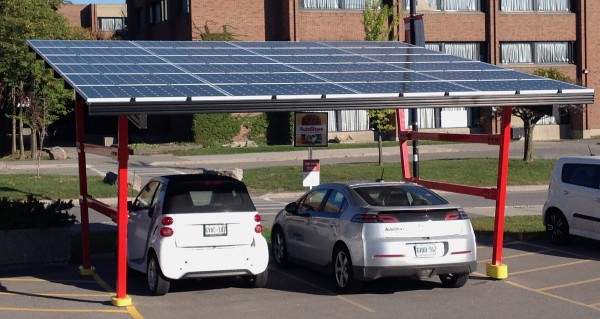TORONTO, December 10, 2015 – York University is charged up to provide solar energy to its electric-vehicle commuters starting tomorrow thanks to a smart initiative out of the Faculty of Environmental Studies (FES).
Professor Jose Etcheverry and his research team have developed and built a smart grid solar-powered charging station that can store solar electricity and withstand the bitter cold of a Canadian winter. The York U initiative is in line with a recent provincial decision to invest in electric-vehicle charging stations and a global push toward tackling climate change.
The research and charging station will be unveiled Friday, Dec. 11 at 9:30am in the Vanier Parking Lot, Keele campus, York University (number 71 on the Map) followed by a reception in the 2nd Floor Lobby, Kaneff Tower.
The Ontario Minister of Transportation Steven Del Duca will cut the ribbon with York U President & Vice-Chancellor Mamdouh Shoukri, FES Dean Noël Sturgeon, and Professor Jose Etcheverry, who led the initiative.
Data from the station will be used to inform the development of smart grid solutions and the implementation of additional electric charging stations, connected to the power grid at York U, to reduce pollution and greenhouse gases.
“At York University we are committed to being a leader in sustainability, and central to this is the fight against climate change,” said Shoukri. “This exciting and innovative project is an important part of our efforts—and an excellent example of York’s commitment to socially responsive research—as it uses clean, renewable energy while also encouraging the use of electric vehicles to lower our carbon footprint.”
The station uses “made in Ontario-only” solar systems and components that are ideal for extreme winter weather, while fostering new local opportunities.
With the use of fossil fuels for transportation pegged as one of the biggest sources of pollution in Canada and beyond, the solar charging station is a start toward reducing emissions. It is an on the ground practical and local response to climate change, and an innovative smart grid approach for increasing electric mobility solutions on campus.
"This solar electric vehicle charging station aims at inspiring new practical local solutions and additional innovations to reduce climate change and pollution," said Etcheverry.
The charging station is modular in design and can be easily installed in most parking areas. “It is tailor-made for Canadian weather and can be installed anywhere where solar resources are available,” said Etcheverry.
“The Ontario government is supportive of green, clean, innovative technology that will transform the way we live, move, work and adapt to our environment,” said Del Duca. “Charging stations that are fast, reliable and affordable will encourage Ontarians to purchase electric vehicles, reducing greenhouse gas pollution and keeping our air clean.”
The goals of the project include showcasing Ontario-made solutions that enable technological innovation, environmental protection and knowledge mobilization. The result is the development of practical policy suggestions to increase the use of renewable energy in the transportation sector.
The project is funded by the Toronto Atmospheric Fund, Metcalf Foundation, Mitacs and is a practical research collaboration between York University's Sustainable Energy Initiative and Campus Services and Business Operations. Private sector partners include: Kinetic Solar, Silfab, Sun Country Highway, Daymak, Enterprise CarShare, Canadian Energy, Solar Trust and Joshua Four.
York University has been named as one of Canada’s Greenest Employers for the past three years. It was also ranked second by Corporate Knights magazine on its Future 40 Responsible Corporate Leaders list for 2015.
York University has always been known for championing new ways of thinking that drive teaching and research excellence. Our 52,000 students receive the education they need to create big ideas that make an impact on the world. Meaningful and sometimes unexpected careers result from cross-discipline programming, innovative course design and diverse experiential learning opportunities. York students and graduates push limits, achieve goals and find solutions to the world’s most pressing social challenges, empowered by a strong community that opens minds. York U is an internationally recognized research university – our 11 faculties and 24 research centres have partnerships with 200+ leading universities worldwide.
-30-
Media Contact:
Sandra McLean, York University Media Relations, 416-736-2100 ext. 22097 / sandramc@yorku.ca


